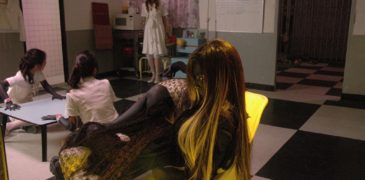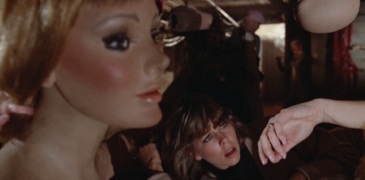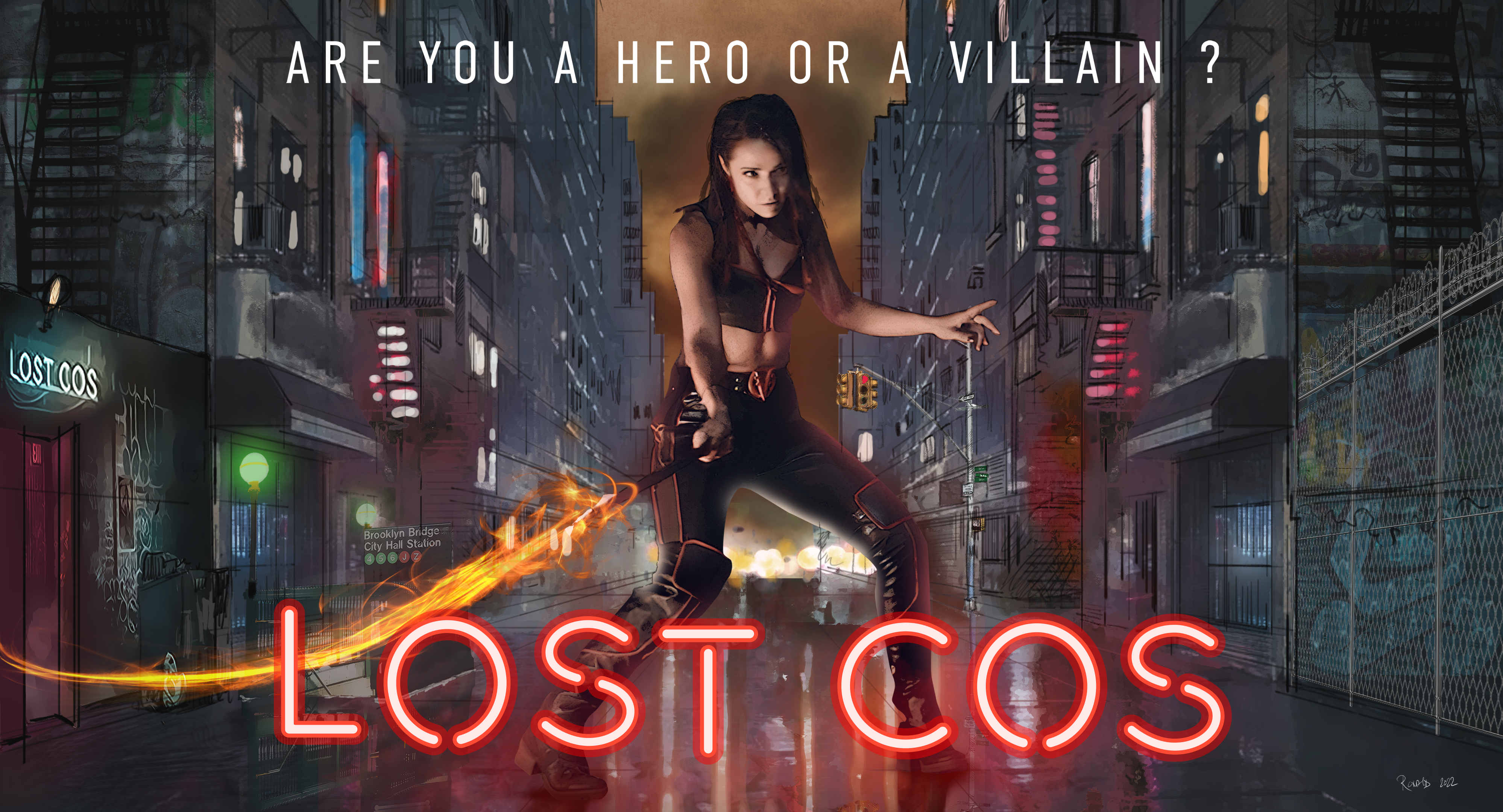

Are You a Hero, Or a Villain?
“Flesh, flash, and fantasy” are the themes of Broadway producer Robin de Levita’s directorial debut film, Lost Cos (2023). It follows the story of Eni (Evgeniya Radilova), a dental assistant who is traumatized by the loss of her girlfriend Lia and trying to come to terms with her new reality. At night, she works as a dancer at “Lost Cos”, a unique cosplay club that features a wide variety of live performances, from EDM bands to burlesque strip teases. Eni, struggling to come to terms with her loss, uses her vampiric cosplay character to enact revenge on some of the less savory patrons of the club. Eni is fierce and quite striking, and her weaponry skills hint at a previous stint as a circus performer. The premise is strong, but the execution is unfortunately lacking.
Lost Cos could have been something like an LGBTQ+ version of Scott Pilgrim vs. the World (with a bigger budget, of course), but it couldn’t keep the plotline tight enough to form a coherent story. In the first few minutes of the film, we see a young girl being abused by her mother before escaping, two police officers joking over the dead body of a man dressed as “Merman” on the Jersey shoreline, and Eni assisting her unscrupulous boss at work then angrily returning home to strip in the hallway before sitting at a computer to chat with a stranger while eating a raw potato with a huge kitchen knife. When she realizes he is stalking her, she whips the knife across the room and lands it in the middle of a man’s portrait before going into a frenzied kickboxing/exercise sequence that becomes almost pornographic. This is followed by the introduction of the stalker and his sidekick, a pair of incels (involuntary celibates) who hate Eni and make a plan to assault her. Break into an animated comic book-style sequence, and there you have it, the film’s tone: chaos.
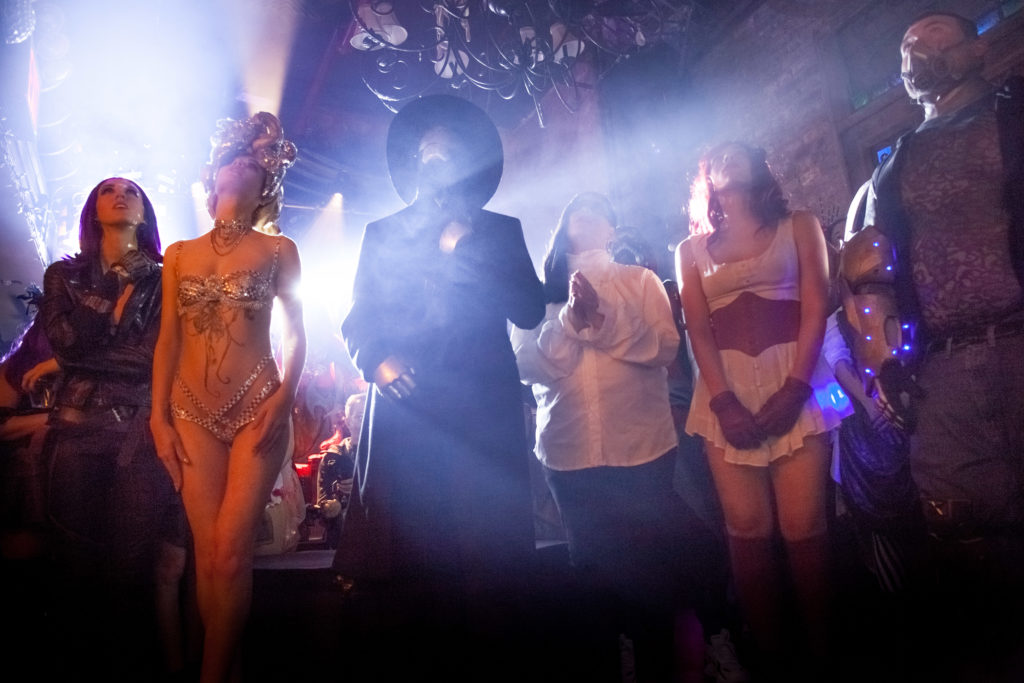
The story asks us the question “Are you a villain, or are you a hero?”, and tries to put Eni in both positions throughout, but there is just too much going on to keep that idea firmly planted with the viewer. Gratuitous nudity is a constant, flashbacks are not cued as such and make the film hard to follow at points, and many of the scene switches are clumsy. The animated sequences are used in place of shooting action scenes which some reviewers did not like, but when taken as part of the cosplay/comic-themed story, they work. They also do more for character-building than most of the script. It’s a difficult film to review, because every time the viewer gets mad at it, it redeems itself for a moment. Some truly funny scenes come out of nowhere and don’t seem to fit the vibe at all, but you have to appreciate a massive Minotaur and a cowgirl getting it on behind closed doors in a bathroom stall, especially when her cowboy boots appear above the top of the door. But then you’re jerked back into another ill-fitted scene that has nothing to do with the story so far, and you forget why you’re laughing. It’s almost like the movie was written and filmed by several people who all had different ideas of what the project was about, they didn’t have a pre-game meeting, and they didn’t do any blending in the editing room.
What the Film Did Well
Lost Cos portrays the LGBTQ+ community very well and bluntly communicates some of the issues they face. There is no mockery of or explanation for any of the characters, they just are who they are, exactly as it should be. The main character is gay, but that’s not the point of the film. This is not an attempt to “horn in” on an underrepresented group; it’s a story about cosplayers and burlesque performers, some of whom are LGBTQ+. One character, a drag queen, is accosted in the street on her way to the club and physically beaten by three men. The scene immediately cuts to another animated sequence in which she becomes the aggressor and scares them away. When she arrives at the club and spots Eni, she does not break down in tears, instead holding her head high while her hands shake. It’s one of the film’s strongest scenes for its formidable display of how hard some people work to overcome personal tragedy.
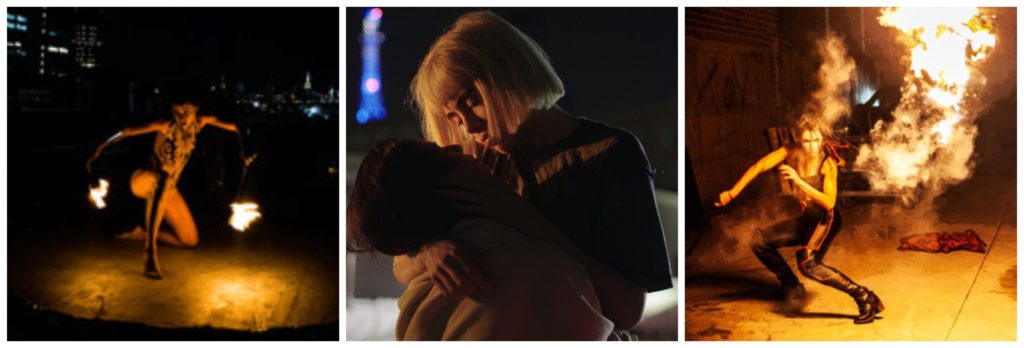
Actor Evgeniya Radilova excels in her role as Eni, demonstrating her athletic prowess in several scenes that require her to handle flaming whips or physically combat men. She plays the villainous side of her character with palpable malice, but then shows her emotional range in scenes with or about her girlfriend Lia. In a scene near the end of the film, Eni faces her truth and delivers a beautiful, thoughtful, relevant soliloquy about being strong and moving on. The scene is visually stunning, as well, imbuing the viewer with a sense of peace after watching utter chaos for almost 90 minutes. But then Eni is pushed into an extended revenge scene that just feels jarring after such cinematic beauty and the moment is gone. If that sequence had been animated like the other action scenes were, it could have flowed better, especially into the extremely “comic book” ending.
The costumes in Lost Cos are also exceptional, with several memorable characters like “Gemini” (Darrell Thorne) dominating the screen and demanding the audience’s attention. The club itself is a fascinating, multi-level dreamland for any kind of club kid, and de Levita uses smart scenes to show it off. After following the club manager around for a few minutes, viewers will wish they could explore this place themselves, irl.
It’s safe to call de Levita’s Lost Cos “experimental” cinema, but sci-fi action fantasy more than covers it. It’s unfocused, chaotic, and messy at times, but its heart is in the right place. While it might not pack as much punch as it could have, it’s still going to be a fan favorite for lovers of b-movies, cosplay, comics, and topless women. Lost Cos is coming to US theaters on December 8, 2023.
Lost Cos will be available in cinemas on December 8th
More Film Reviews
Sick Nurses (2007) Review – An Absolutely Outrageous EVENT of a Movie
READER WARNING: Ghosts starring in this review may contain an excessive amount of exploding glitter. Konnichiwa! Bonjour! What’s the story, bud!? Straight Outta Kanto here, bringing you a big fat…
Benny Loves You Review – Toy Story: Murderous Millennial Edition
Anyone who’s read Straight Outta Kanto’s previous reviews will know that I like my budgets low and my horror, comedy. That being said, when going in to what one knows…
Stopmotion (2023) Film Review – The Magic of Animation
A bizarre blend of Phil Tippett’s Mad God and Dario Argento’s Suspiria, Robert Morgan’s feature debut Stopmotion (2023) is an indie horror film that weaponizes the maddening process of stop…
The Sadness Film Review – What The F*** Did I Just Watch!?
The Sadness has been a film making some early commotion due to an extreme and graphic nature – a new angle on the zombie genre in the age of our…
Cherry Falls (2000) Film Review – Be True to Your School
1996’s Scream was a game-changer for the slasher genre. By playing with well-established conventions, the movie directly engaged the audience in a conversation about what they were watching and toyed…
Deadly Games (1982) Film Review – Low-Key Slasher That Slipped Under the Radar
If you ask a casual movie goer to list some classic horror films, a large majority of them will mention Halloween, Friday the 13th, and The Texas Chainsaw Massacre. One…

Kate’s love of all things dark began as a child and deepened when she realized what being an adult meant. She was born with a pencil in her hand and loves nothing more than writing horrific stories to tantalize her inner demons. Kate lives in Hamilton, Ontario Canada with her husband and her boys, stirring up trouble wherever she can.
